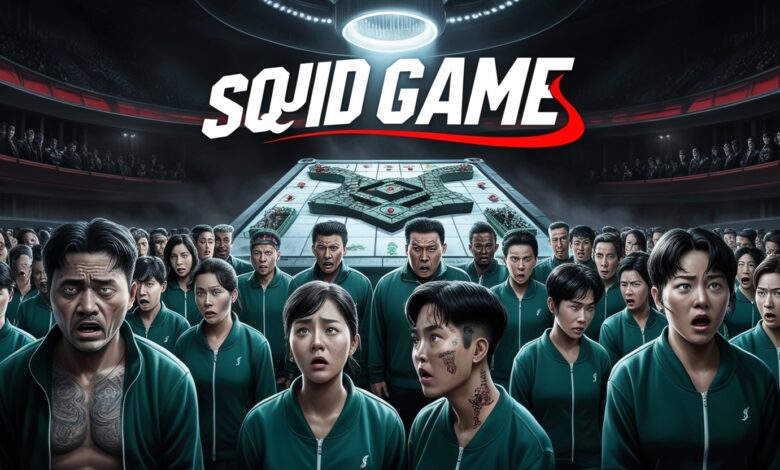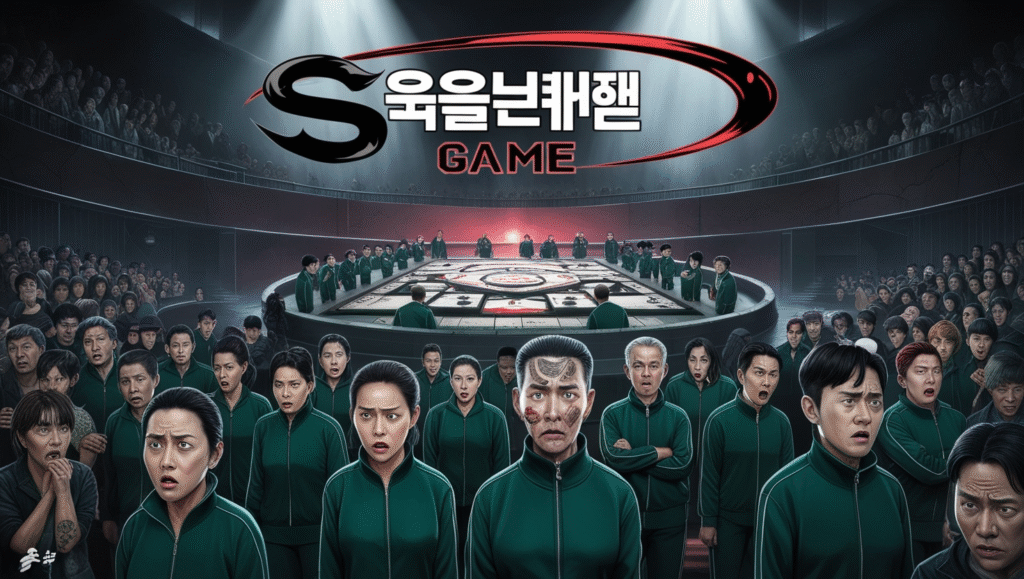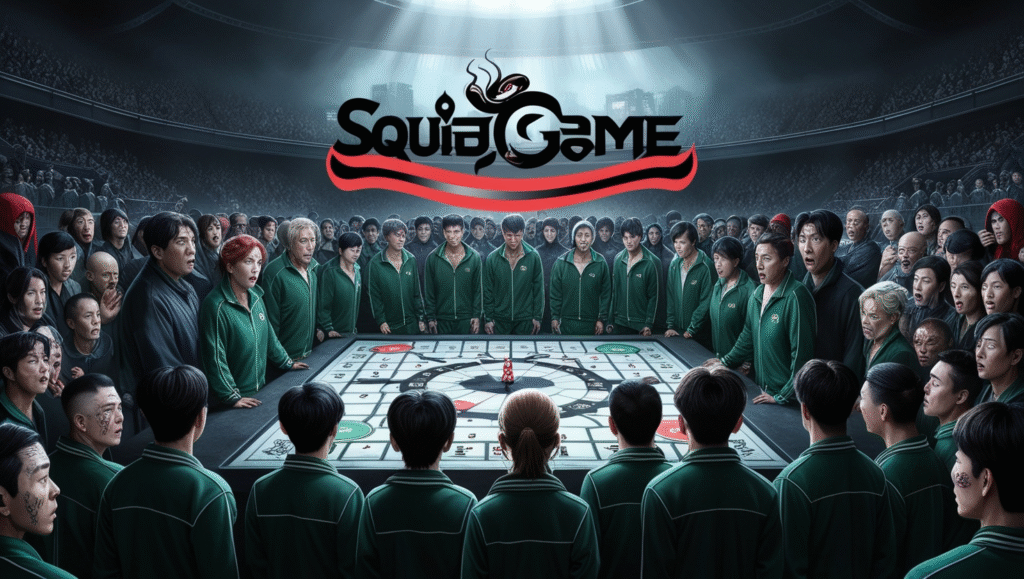Is Squid Game Based on a True Story? Exploring the Real-Life Inspirations Behind the Show

Is Squid Game based on a true story? While the deadly games and extreme scenarios depicted in the show are fictional, the inspiration behind them draws from real-life events. The creator, Hwang Dong-hyuk, crafted the series as a reflection of societal issues, particularly focusing on economic disparities and the lengths individuals might go to escape financial despair. The narrative, though dramatized, resonates with real-world struggles, making the show both captivating and thought-provoking
The show’s premise of individuals participating in life-threatening children’s games to win a substantial cash prize mirrors the desperation faced by many in real-life situations. Hwang’s personal experiences and observations of South Korea’s economic challenges influenced the creation of Squid Game. By drawing parallels between fictional events and actual societal issues, the series highlights the stark realities of economic inequality and the human condition under pressure
Unveiling the Truth: Is Squid Game Based on a True Story?
Is Squid Game based on a true story? While the dramatic and deadly games in the show are fictional, the inspiration comes from real social issues. The creator, Hwang Dong-hyuk, designed the series to reflect financial struggles, social inequality, and human desperation. He imagined what people might do if extreme debt or poverty forced them into impossible choices. Though the violent competitions are not real, they symbolize real-life pressure many people face in the world. Viewers are drawn to the tension and emotion because the story reflects recognizable human behavior, such as greed, survival instinct, and trust. In that sense, Squid Game is a mirror to reality, not an exact historical event.
The Real-Life Events That Inspired Squid Game’s Storyline

Squid Game’s storyline may seem fantastical, but it is rooted in real-life inspirations. Hwang Dong-hyuk revealed that he drew from his own experiences during economic hardship in South Korea. He observed societal pressures, debt problems, and the widening gap between rich and poor, which became central themes in the show. Certain scenes, like participants risking everything for money, echo the struggles of individuals in desperate situations. The games themselves are exaggerated, but the emotions and motivations behind them are very real. Through these fictional games, the series explores human psychology under extreme conditions, highlighting how ordinary people might act when their survival and financial security are at stake.
Squid Game and the Brothers’ Home: Fact vs. Fiction
The Brothers’ Home incident, referenced in discussions about Squid Game, adds intrigue to the idea of “true story.” While the show does not directly retell this tragedy, the concept of extreme human suffering and desperation is similar. Hwang Dong-hyuk used stories like this to capture the tension between morality and survival. In reality, such events are rare but highlight societal failures, which the show critiques. By blending elements of fact with fiction, Squid Game creates a powerful narrative that resonates emotionally. Viewers can relate to the fear, greed, and difficult choices the characters face because, while dramatized, the scenarios reflect societal pressures that exist in many parts of the world today.
Exploring the Ssangyong Motor Strike: A Real-Life Parallel to Squid Game
The Ssangyong Motor strike in South Korea is often mentioned as a real-life influence on Squid Game. This event, where workers faced financial ruin and uncertainty, parallels the show’s theme of economic desperation. Employees risked their livelihoods to protest unfair treatment, showing the lengths people go to survive financially. Squid Game mirrors this tension by creating life-or-death stakes for money. The strike demonstrates societal inequality, while the show exaggerates it for dramatic effect. Both reveal the struggles ordinary people endure under economic pressure. By using real events as inspiration, Hwang Dong-hyuk crafts a story that is extreme but believable, making the audience think about the world outside the screen.
How Squid Game Mirrors Real-World Economic Struggles

Squid Game reflects real-world economic struggles in a dramatic way. The players in the show face insurmountable debt, which mirrors the financial hardships many people experience globally. This desperate situation drives the story, showing how economic pressure can force individuals into morally complex choices. The games act as a metaphor for the competition and survival instinct found in real life, whether it’s paying bills, finding jobs, or dealing with societal inequality. By showing exaggerated scenarios, the show helps viewers understand the impact of poverty and social imbalance. Squid Game resonates because it dramatizes the challenges faced by many, making social issues more visible through the lens of thrilling storytelling.
Behind the Mask: The True Inspirations for Squid Game’s Deadly Games
The deadly games in Squid Game may look fictional, but they have symbolic real-life inspiration. Hwang Dong-hyuk created these challenges to reflect the extreme pressure of financial struggles. Games like “Red Light, Green Light” represent life-or-death decisions people face under stress. While no one is literally forced to play violent games for money, the psychological tension mirrors real-world situations like workplace stress, debt, and competition. The masks and anonymity of the organizers symbolize societal detachment from human suffering. These elements emphasize the cruelty that can emerge when desperation meets inequality. Through creative storytelling, the show conveys harsh truths in a way that captures viewers’ attention while educating them about social realities.
From Reality to Screen: The True Stories Behind Squid Game’s Characters
The characters in Squid Game are not direct representations of real people, but they are inspired by true-life experiences. Each participant embodies struggles faced by ordinary individuals under extreme financial pressure. Hwang Dong-hyuk studied society and included traits like greed, loyalty, and desperation that exist in reality. The show amplifies these traits to tell a more engaging story, but the core emotions are authentic. By doing this, Squid Game allows viewers to empathize with characters while reflecting on their own lives. These fictional characters provide insight into the human response to inequality, debt, and survival, making the show feel grounded even amid violent and exaggerated challenges.
Is Squid Game Based on a True Story? Debunking the Myths

Many people wonder if Squid Game is based on real events, and myths often spread online. In truth, the show is mostly fictional, created for entertainment and social commentary. While certain events and societal issues inspired it, the deadly games themselves never happened. Some claims confuse allegorical elements with real life, leading to misconceptions. Hwang Dong-hyuk has confirmed that the show combines imagination with observations of society. The myths, however, reflect how compelling and realistic the series feels to viewers. Debunking these myths is important so audiences can appreciate the creative storytelling while understanding the distinction between dramatization and reality.
The Brothers’ Home: A Real-Life Tragedy That Echoes in Squid Game
The Brothers’ Home tragedy is often cited as an influence on Squid Game’s tone. While the show does not recreate the event, it mirrors the desperation and societal failure that tragedy represents. The emotional weight of loss, poverty, and neglect informs the narrative, showing how individuals respond under pressure. Hwang Dong-hyuk used such real-life examples to highlight inequality, greed, and survival instincts. The show transforms these ideas into fictional stories that feel emotionally truthful. By doing so, Squid Game reminds viewers that while the plot is extreme, it reflects struggles that exist in society. This blend of fact-inspired emotion and fiction gives the series a compelling depth.
Squid Game’s Allegorical Roots: Drawing Parallels with Real-Life Events
Squid Game’s roots are deeply allegorical, using fiction to reflect real-life events and social issues. The games serve as metaphors for financial struggle, competition, and inequality. Characters’ choices highlight how society pressures individuals to survive at any cost. Hwang Dong-hyuk drew inspiration from real-world stories of debt, poverty, and human desperation to make the narrative emotionally realistic. While the series exaggerates these challenges, the underlying themes resonate with many viewers. By connecting allegory with reality, Squid Game educates while entertaining, showing how human behavior changes under stress. The parallels to real-life events give the show both depth and relevance, making it a cultural phenomenon that sparks discussion beyond entertainment.
Conclusion
Squid Game is not based on a true story. The games and challenges are made up to make the show exciting and dramatic. But the feelings of fear, stress, and money problems in the show are real. Many people face hard choices when they have no money, just like the characters in Squid Game.
The creator wanted to show how unfair life can be when money is involved. Even though the story is fictional, it helps people understand real-world problems like debt and poverty. Squid Game mixes imagination with real-life lessons, which is why it is so popular and makes viewers think about life.
FAQs
Q: Is Squid Game a real-life story?
A: No, Squid Game is fictional. The games are not real, but the show reflects real social and money problems.
Q: Who inspired Squid Game?
A: Hwang Dong-hyuk, the creator, was inspired by economic struggles and inequality in South Korea.
Q: Are the games in Squid Game real?
A: No, the games are made up. They are exaggerated to show tension and life-or-death choices.
Q: Does Squid Game show real social issues?
A: Yes, it shows money problems, debt, and inequality that many people face in real life.
Q: Can Squid Game happen in real life?
A: No, the extreme life-or-death competitions are fictional. But it teaches lessons about survival and human behavior.





